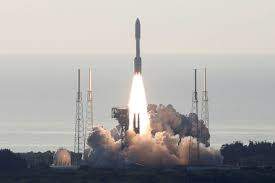NASA's Perseverance Rover Launched on Mission to Mars

NASA’s ambitious Perseverance rover rocketed toward Mars on a mission to find signs of life there that might have existed billions of years ago when the solar system was a cradle of evolution.
A United Launch Alliance Atlas V rocket boosted the $2.7 billion spacecraft from the Cape Canaveral Air Force Station in Florida early Thursday on a 300-million-mile voyage between the planets. If all goes to schedule, the spacecraft will land on Feb. 18 at a 28-mile-wide basin called Jezero Crater just north of the Martian equator.
Mission scientists believe that between three billion and four billion years ago the crater was a vast lake fed by an ancient river delta that deposited carbonite minerals and clay potentially preserving organic molecules and other potential signs of microbial life. During a two-year mission, the nuclear-powered Perseverance rover will try to detect any such biosignatures, extract them from rocks or soil and pack the samples for eventual return to Earth.
“We expect the instruments onboard will be able to detect biosignatures, but it will be very difficult to confirm that until we get them back to Earth,” said NASA planetary science division director Lori Glaze. It will require at least two additional Mars missions to pick up and return those samples, agency officials said.
The NASA Perseverance mission joins two spacecraft already on the way to Mars that were launched by China and the United Arab Emirates earlier this month. It is the first Mars mission for both countries. All three are expected to arrive at Mars at about the same time next year.
NASA’s 2,200-pound Perseverance rover is the most complex off-world vehicle NASA has ever launched, agency engineers said. In a cab the size of a compact car, it packs 13 onboard computers, 23 cameras and seven onboard experiments designed to probe rocks and sediments for signs left by microscopic life-forms—if any ever existed on the planet.
About six weeks after a safe landing, the rover will unpack and deploy an experimental robotic helicopter called Ingenuity, which will be flight-tested in the first powered flights on another planet.
Photo: JOE SKIPPER/REUTERS
Link: https://www.wsj.com/articles/nasa-s-perseverance-rover-launched-on-mission-to-mars-11596111859











